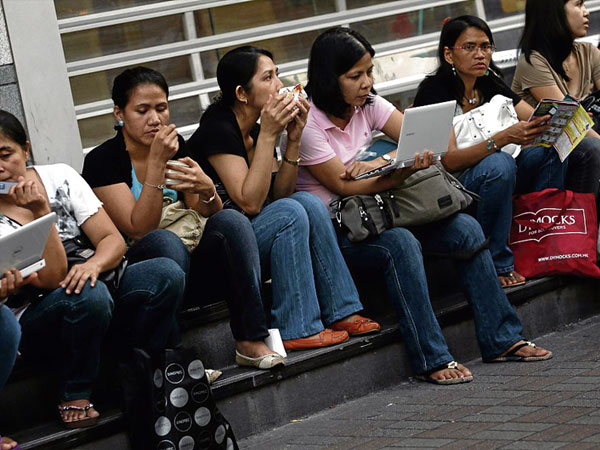The new slave masters
Hired household help is a common practice across the world. Depending on one’s location and disposable income, the options may include a teenage babysitter, “aunty” from the village, the au-pair exchange student or a foreign domestic worker (FDW).
Growing in popularity is the live-in FDW, originating from Ethiopia, Indonesia, Nepal, the Philippines and other countries. To process the paperwork, recruitment agencies (RAs) are popping up in major cities across the world with tag lines promising trained and competent domestic workers, to whom they also promise lucrative opportunities for work abroad. What appears to be a simple business process has in actual fact become a tool for labour trafficking and modern-day slavery.
Desperate to leap out of the poverty cycle, countless women in Southeast Asia are soliciting RAs to secure employment abroad. Typically, there are two RAs involved in this process –i.e. one in the country of origin and another in the foreign country. Both enjoy a market with high demand and high supply, coupled with poor regulation between departments and across borders.
According to Amnesty International there are more than 300,000 FDWs in Hong Kong (HK), of which the majority are women from the Philippines and Indonesia. We see them gather over the weekend in various parts of the city. Employers sponsor the recruitment of their FDWs, with a standard fee that covers the costs of admin charges, medical exams, the work visa and flight tickets. Yet RAs are charging excessive fees to the FDWs, up to 20 times the legal rate as reported by the South China Morning Post. In fact, RAs routinely charge excessive fees; they also deceive women about the terms of their services and confiscate identity documents. The hefty HKD 21,000 fee is supposedly for “training”, payable cash upfront or packaged as a personal loan.
Servicing this loan requires the FDW to forfeit up to 80 per cent of her salary during the first seven months of her contract. At the mercy of her employer, the domestic worker feels compelled to work off the bondages of her employment. Quite an organized syndicate, she is given a registration card with her personal information and payment instructions, which she may present at her nearest 7-Eleven to make the transfer. Now, suppose the domestic worker considers this to be a grave injustice and decides not to pay or she innocently falls behind on payments, what would happen?
Article continues after this advertisementFirstly, there are persistent phone calls made to her, to her family back home and even to her employer with all sorts of threats and accusations. She is unable to work peacefully and does not enjoy the reward of her labour. This results in emotional turmoil and a fear for personal safety, thus straining relations with her employer and making her a hazard in the workplace, your home. The supposed hired help now becomes a liability and you are astounded by how this could happen.
Article continues after this advertisementSecondly, unsuspecting employers are exploited further and incited by RAs into revealing their grievances against their domestic worker, establishing grounds to terminate their contract. While the employer would be offered a replacement at no charge, the domestic worker is spiralled into more debt. The RA charges her with a fine and an additional HDK 21,000 fee / loan to arrange another job. As the cycle repeats itself time and again, the domestic worker finds herself entrapped in labour trafficking and modern-day slavery.
This trend is ongoing and this domestic worker could end up working for you. There is urgent need for our collaborative efforts towards stopping the extortion of vulnerable foreign domestic workers into the cycle of exploitation. Employers have the authority and the ability to intervene, and here are some practical guidelines:
- When opening your home to a live-in foreign domestic worker, consider all the baggage that she may be carrying;
- During initial consultations with the RA, do not agree to a blind placement;
- While interviewing candidates, enquire on whether they have paid any unwarranted fees to their RA or signed a loan agreement;
- Before the first salary is due, verify with your domestic worker that she is not indebted to her RA and/or any of its associates.
Scrutinizing the freedom of FDWs puts the spotlight on the ethical practices of the recruitment agencies. Employers should stand firmly against the entrapment of domestic workers, in order to curb the cycle of labour trafficking and its propensity towards modern day slavery.
___
Carine Kiala is with the Trade and Investment at the Consulate General of the Republic of Angola in Hong Kong SAR. The Global Shapers Community, an initiative of the World Economic Forum, is a worldwide network of city-based Hubs developed and led by promising young leaders who want to build on their achievements and entrepreneurial drive to make a positive contribution to their communities. It is independent, neutral, non-political and not for profit.
RELATED STORIES
POEA blacklists Saudi job agency after Filipina was abused by employer
PH maids in HK seek direct hiring as recruitment agencies demand placement fees
Recruitment agency’s licence cancelled
